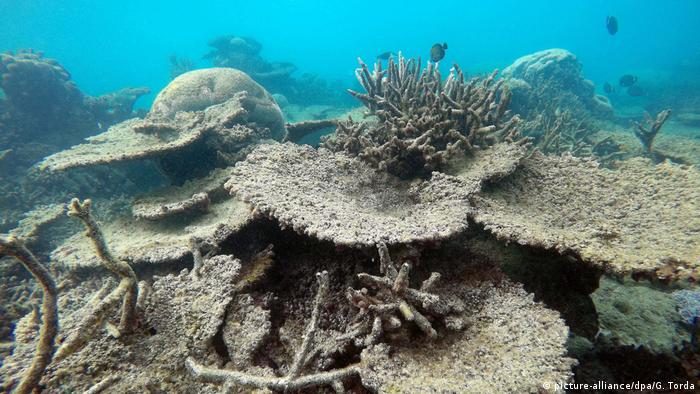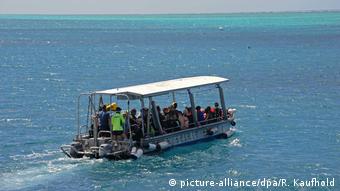Australia’s Great Barrier Reef has suffered two consecutive years of coral bleaching. Scientists warn of an impending disaster for the UNESCO world heritage site. The natural wonders will disappear in the climate change?

The Australian government was relieved when the UNESCO in 2017, decided to delete the Great Barrier Reef of Australia from its list of endangered world heritage sites. However, the government maintains the power supply by coal, although the largest coral ecosystem in the world suffers from extreme coral bleaching. According to estimates, the reef will lose up to 50 percent of its coral.
The United Nations have reiterated their warnings to the survival of coral reefs. They would disappear if global warming rises to two degrees Celsius above pre-industrial levels.
The Australian government under the conservative Prime Minister, Scott Morrison holds on to the coal. In the past year Morrison had brought, then as Treasurer, a piece of coal with her to the Parliament to proclaim that no one should have to fear. Coal appears to be back in business.
Coal and climate protection do not fit together, on the other hand emphasises Richard Leck from WWF Australia. “Some of our greatest national treasures, including the Great Barrier Reef, are in great danger.”
Coal versus climate
With 2,300 kilometers in length and 344.400 square kilometres the Great Barrier Reef is the largest coral reef Ecosystem in the world. Together with the Sydney Opera House is probably Australia’s most famous landmark. It attracts over two million visitors per year.
Why should endanger the government is such an important icon? It’s a charming theme that often seems to be more of a polemic than policy-dominated, fueled by heavy industry, conservative commentators and deniers of climate change. But this polemic seems to be working, because the Australian government’s line in the last week, a $ 10 million investment for PR activities, which should set out the positive role of the government in the rescue of the reef.

Diving the coral island of Michaelsmay Cay on the Great Barrier Reef
“I don’t have much faith that the government is doing its Best to preserve our natural treasures,” says the climate researcher Sarah Perkins Kirkpatrick of the University of New South Wales. “If you take the protection of the reef seriously, you have to stop the pollution, and greater efforts to reduce climate change.”
It’s now or never
“Polls show that the majority of Australians in favour of more ambitious action against climate change,” says Richard Leck from WWF. As the party in government in 2017 – refused out of fear of protests by their religious and conservative base, is to adopt a law on the equality of same – sex marriages, she decided instead to go for a non-binding referendum. A clear vote in favour of forcing the government finally, the Eheänderungsgesetz.

Visible traces of the rising sea temperatures, coral bleaching in the Great Barrier Reef
The Great Barrier Reef could be the next subject for a referendum. Next year Australia will elect a new Parliament. The Great Barrier Reef brings to the Australian economy annually, about 5.4 billion dollars and jobs for 70,000 people.
“Most Australians see the protection of the Great Barrier Reef as an environmental problem number one in Australia. To reduce our emissions and to play an internationally leading role in climate protection, we will not create it, the reef is in a healthy state to our children and grandchildren to pass on,” says Richard leak.
Although the reef among the coral bleaching as well as under the crown of thorns starfish has suffered, it has its magical attraction as a tourist destination is preserved. Some of the tourism companies on the Australian North-East coast of Queensland complain of a decline in the number of the visit as a result of ocean warming. Others notice a new Trend: A kind of “Now or never”-tourism.

Transfer to the Great Barrier Reef, but for how long?
A thought that is not also Sarah Perkins Kirkpatrick foreign. “Based on the current Commitments to global emissions reduction, it will be up to the year 2100 of 2.7 to 3 degrees warmer,” she said to the DW. “It is a very high probability that we will exceed by 2050 to 1.5 degrees. The reef will change irrevocably. I will not other dictate what you should do in relation to your travel plans, but I do know that I want to show it to my children – before it is too late.”
Many people know that the Great Barrier Reef will not last forever, says Richard leak. But he believes that “there will still be parts of the reef that will take your breath away. The reef is still inspiring. It is not a Wasteland but an incredible thing that it is worth saving.”